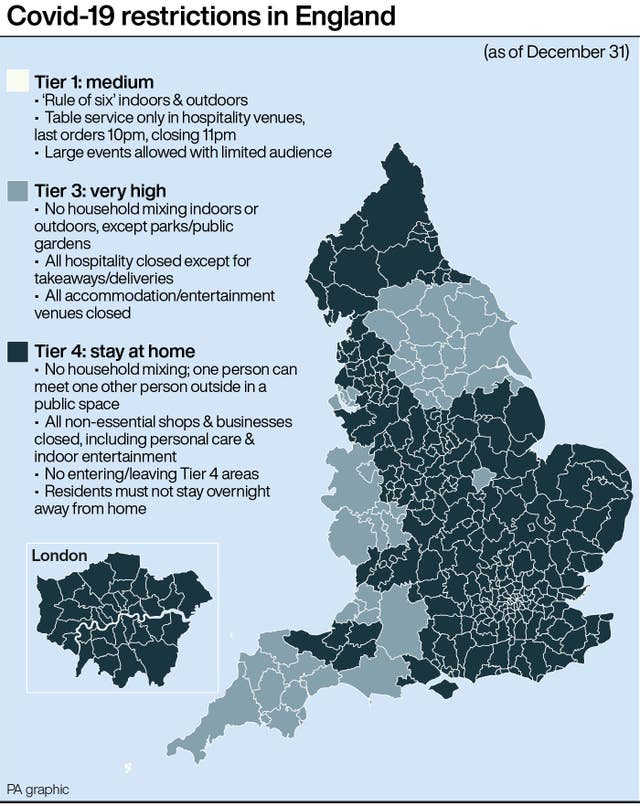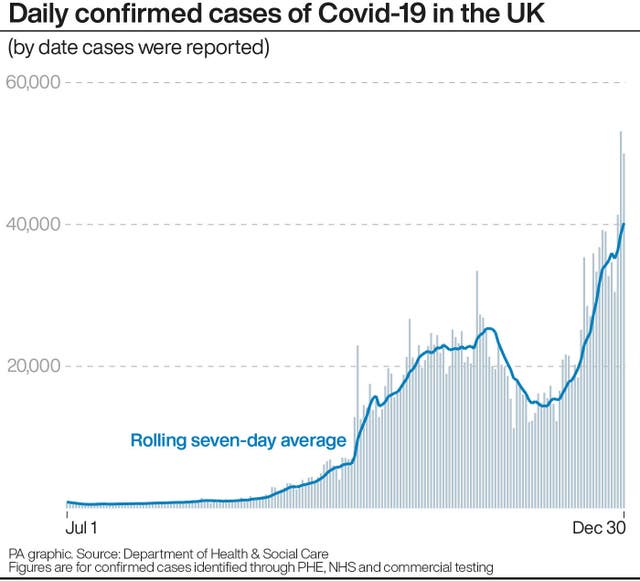UK approves Oxford vaccine as millions more people face toughest lockdown
Health Secretary Matt Hancock said more than three-quarters of the population of England will now be living under Tier 4 restrictions.

The UK has approved a new Covid-19 vaccine from Oxford University and AstraZeneca as millions more people were plunged into the toughest Tier 4 lockdown restrictions.
The jab, described as a “game changer”, was given the green light by the Medicines and Healthcare products Regulatory Agency (MHRA).
Health Secretary Matt Hancock said the vaccine is a “great British success story” and 530,000 of doses will be available for rollout from Monday.
But he announced in the Commons that more parts of the country are entering Tier 4, with most other areas moving to Tier 3.
It comes as a further 981 people had died within 28 days of testing positive for Covid-19 as of Wednesday, bringing the UK total to 72,548.
This is the highest daily figure reported since April 24, when 1,010 deaths were reported, but there is likely to be a lag in reporting deaths over the Christmas period.
Among the areas moving to Tier 4 are the Midlands, parts of the North East and North West and parts of the South West.
An additional 20 million people will moved to the highest tier. This means a total of 44 million people will now be in Tier 4, or 78% of the population of England.
Some 12 million people will be in Tier 3, or 22% of the population, while no area will be in Tier 2.
According to the Department of Health, between December 18 and 24, the weekly Covid-19 case rate in England rose to 402.6 per 100,000, a 32% increase on the previous week.
Some 14,915 patients have been admitted to hospital with Covid-19 in the past week, an 18% increase on the week before.

Mr Hancock told MPs: “Sharply rising cases and the hospitalisations that follow demonstrate the need to act where the virus is spreading.”
He said a new highly transmissible variant of coronavirus is now spreading across most of England, adding that “cases are doubling fast”.
He said immediate action was needed, despite vaccines offering a way out of the pandemic.
“The vaccine is the route out of this crisis and the approval this morning of the Oxford/AstraZeneca vaccine is another world-first for Britain and it’s the single biggest stride that we’ve been able to take since this pandemic began,” he told MPs.
Earlier, Mr Hancock told Sky News he was “highly confident that we can get enough vulnerable people vaccinated by the spring that we can now see the route out of this pandemic.”
Prime Minister Boris Johnson said the approval of the vaccine was “fantastic news” and “a triumph for British science”.
The UK has ordered 100 million doses of the Oxford University vaccine, enough to vaccinate 50 million people.
The plan is to vaccinate all vulnerable groups first, with all adults eventually offered the jab.
Dr June Raine, chief executive of the MHRA, said her team of scientists and clinicians had “very carefully and methodically and rigorously reviewed all the data on safety, on effectiveness, and on quality”.
She added: “No corners, whatsoever, have been cut. The safety of the public always comes first.”
Dr Raine said each batch of vaccines is individually checked and the first batch of the new jabs was released last night.
Data published in The Lancet medical journal in early December showed the vaccine was 62% effective in preventing Covid-19 among a group of 4,440 people given two standard doses of the vaccine, when compared with 4,455 people given a placebo drug.
Of 1,367 people given a half first dose of the vaccine followed by a full second dose, there was 90% protection against Covid-19 when compared with a control group of 1,374 people.
The MHRA has authorised two full doses of the vaccine, with the second dose given four to 12 weeks after the first.
It said the vaccine was up to 80% effective when there was a three-month interval between the first and second doses, according to data that has yet to be published in a medical journal.
A first dose of the jab gives 73% effectiveness from three weeks after immunisation until a second dose at 12 weeks, according to the MHRA and the Joint Committee on Vaccination and Immunisation (JCVI), although some experts questioned how long this protection would last without a second dose.
The MHRA said it could not recommend a half-dose, full-dose regime for the Oxford vaccine, saying this was “not borne out” by the full analysis.
In The Lancet data, 10 people given the placebo were admitted to hospital with coronavirus, including two with severe Covid which resulted in one death.

But among those receiving the vaccine, there were no hospital admissions or severe cases.
Mr Hancock said allowing a second dose up to 12 weeks later was “important because it means that we can get the first dose into more people more quickly and they can get the protection the first dose gives you.”
Professor Wei Shen Lim, of the JCVI, said that with Covid infection rates currently at a high level, the “immediate urgency is for rapid and high levels of vaccine uptake”, with first doses of either Oxford or Pfizer given as quickly as possible.
He added: “This will allow the greatest number of eligible people to receive a vaccine in the shortest time possible and that will protect the greatest number of lives.”
AstraZeneca chief executive Pascal Soriot told BBC Radio 4’s Today programme that deliveries will be ramped up “very rapidly” in the first and second week of January.
He added: “We can go to two million. In January we will already possibly be vaccinating several million people and by the end of the first quarter we are going to be in the tens of millions already.”
Asked whether two million vaccinations per week was possible, Mr Hancock told Times Radio: “That’s absolutely deliverable by the NHS.”
Professor Andrew Pollard, director of the Oxford Vaccine Group, who led the clinical trial, said the approval was “a landmark moment”.
But he said the impact of vaccines is “about getting them into people’s arms, stopping the virus from causing severe disease and hospitalisation, which we know that all of the vaccines can do very efficiently.”
Shadow health secretary Jonathan Ashworth said the vaccine approval was “good news”, tweeting: “Now let’s go hell for leather to get jabs rolled out.”
Scotland’s First Minister Nicola Sturgeon tweeted that “the light at the end of the tunnel just got a lot brighter.”
The Oxford vaccine, which is being made in Oxfordshire and Staffordshire, can be stored in a standard fridge, unlike the Pfizer/BioNTech jab, which needs cold storage of around minus 70C.
It means that this vaccine is easier to roll out to places such as care homes and GP surgeries.
People who have had the Pfizer jab and whose second jab is before Monday should still have it, while appointments for after this date will be rescheduled to allow more first doses to be given.





